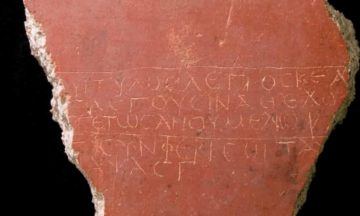Alison Flood in The Guardian:
 For Taylor Swift, the “haters gonna hate”, but she’ll just “shake it off”. Now research by a Cambridge academic into a little-known ancient Greek text bearing much the same sentiment – “They say / What they like / Let them say it / I don’t care” – is set to cast a new light on the history of poetry and song.
For Taylor Swift, the “haters gonna hate”, but she’ll just “shake it off”. Now research by a Cambridge academic into a little-known ancient Greek text bearing much the same sentiment – “They say / What they like / Let them say it / I don’t care” – is set to cast a new light on the history of poetry and song.
The anonymous text, which concludes with the lines “Go on, love me / It does you good”, was popular across the eastern Roman empire in the second century, and has been found inscribed on 20 gemstones and as a graffito in Cartagena, Spain. After comparing all known versions of the text for the first time, classics professor Tim Whitmarsh spotted that it used a different form of metre than usually found in ancient Greek poetry, employing stressed and unstressed syllables. Whitmarsh said that “stressed poetry”, the ancestor of all modern poetry and song, was unknown before the fifth century, when it began to be used in Byzantine Christian hymns. Before the emergence of stressed poetry, poetry was quantitative – based on syllable length.
“We’ve known for a long time that there was popular poetry in ancient Greek, but a lot of what survives takes a similar form to traditional high poetics. This poem, on the other hand, points to a distinct and thriving culture, primarily oral, which fortunately for us in this case also found its way on to a number of gemstones,” said Whitmarsh. “You didn’t need specialist poets to create this kind of musicalised language, and the diction is very simple, so this was clearly a democratising form of literature. We’re getting an exciting glimpse of a form of oral pop culture that lay under the surface of classical culture.” Whitmarsh believes the verse, with its lines of four syllables, with a strong accent on the first and a weaker on the third, could represent a “missing link” between the lost world of ancient Mediterranean oral poetry and song, and the more modern forms that we know today. It is, he says, so far unparalleled in the classical world.
More here.
